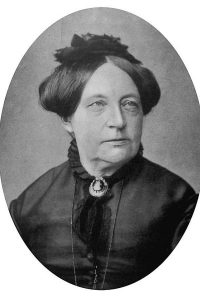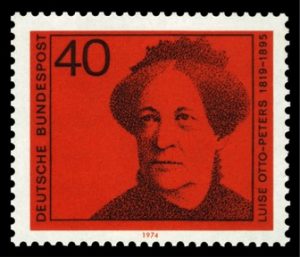Louise Otto-Peters (1819-1895)
“History of all times, of today especially, teaches that women will be forgotten if they forget to think of themselves”
Louise Otto-Peters (1819-1895) was one of the most famous advocates of women’s rights in the middle of the nineteenth century. During the European Revolution of 1848/49 she was the editor of the women’s political newspaper,the Frauen-Zeitungand in 1865 she became the co-founder of the Genera German Women’s Association (Allgemeiner Deutscher Fraueverein, ADF).
Born in March 1819 to a middle-class family in the Saxon city of Meissen, Otto-Peters had a unique and tumultuous upbringing. Her mother, Charlotte Matthäi Otto, was an artist who continuously encouraged her children to emulate “artistic sensibility” within their work, while her father, Wilhelm Otto, a judicial court assessor, made sure that his daughters were always up-to-date with the most recent political and social issues of their time. He is said to have proudly acclaimed his excitement when the state passed legislation allowing women to be executors of estates. It would, he proclaimed to his daughters, end some of the helplessness of women. Otto-Peters homeschooled education typically consisted of examining classical German works, like the novels by the well-known writer Johann Wolfgang von Goethe (1749-1832), and reading modern French novels from female authors like George Sand (1804-1876), who assumed a male pseudonym in order to be taken more “seriously” by readers. Otto-Peters would later use this tactic in an 1848 when she was advocating for better working conditions for women under the male pseudonym “Otto Stern.” Otto-Peter’s upbringing and education proved highly influential in her later social and political works and activism.
By the time Otto-Peter turned twenty-two, a series of tragic misfortunes forced her to make some difficult decisions in respect to her personal life and political career. In 1832, her oldest sister, Clementine, died, followed by the death of her parents in 1835 and 1836 and her fiancé in 1841. Although she was left behind a small inheritance, Otto-Peters found herself in a trying financial situation. In similar circumstances, many other middle-class German women would choose to work as companions to wealthy older women or as governesses to wealthy families. Instead, Otto-Peters attempted to establish herself as a writer while maintaining a seemingly “male-free” household together with her sisters. Her decision to become a writer during a period of increasing politicization of women would eventually lead her to political and social action.
Despite her refusal to conform to societal norms regarding women’s work, Otto-Peters was actually able to support herself through her writings for most of her life. She published her first poem in 1842 but faced heavy criticism by her publisher who suggested that women were publishing too much poetry during this time. Instead, he convinced her to write a novel, which ultimately appeared as the two-volume novel Ludwig the Waiter (Ludwig der Kellner) in 1843. Her first volume of poetry, Songs of a Young German Woman (Lieder eines deutschen Mädchens), was then published in 1847. In addition to writing poems, novels, novellas, short stories, historical works, Otto-Peters would later publish the first newspaper in Germany specifically devoted to women’s issues.
Following the publication of her initial publications, Otto-Peters’ work appeared in a variety of magazines and journals, receiving widespread attention for her unique content. Throughout her works, Otto-Peters displayed her intense commitment to German liberalism, especially in respect to the societal ideas of womanhood. In her 1845 book, Schloss und Fabrik (Castle and Factory), she created independent female characters who were also able to live rich, fulfilling lives despite lack of love or marriage. The work was censored by the German government due to its “radical material,” primarily its argument that middle-class Germans, such as herself, should be greatly concerned with the treatment of both male and female workers in the new factories arising in Germany. At this point in her life, Otto-Peters was regarded within society as an infamous women’s rights advocate, organizer, educator, publicist, and a political writer.
After establishing her literary career, Otto-Peters moved to Leipzig in 1848, the year when the Revolution of 1848/49 started. She remained in the city for most of the rest of her life. In 1849 she founded the Frauen-Zeitung, a newspaper specifically devoted to women’s concerns and directed towards women readers. The motto of the newspaper was “Dem Reich der Freiheit werb ich Bürgerinnen!“” (Female Citizen for the Republic of Liberty). The main aim of the Frauen-Zeitung, which was published until it was not longer allowed by the government in 1852,was to disseminate political and social information related to women, on the premise that discussions “among sisters” would “bind women together” and make them stronger as a whole. It was a forum for discussions, opinions, and various debates related to the duties and rights of women, including working class women, within German society.
In 1858 Louise Otto Peters married the writer and journalist August Peters, whom she knew and loved since the Revolution of 1848/49. Their marriage was delayed several year, because he had been persecuted and punished after the defeat of the revolutionaries with seven years prison. Together they published until his death in 1864 the Mitteldeutsche Volkszeitung. Otto Peters was responsible for the feature.
In October 1865, Louise Otto-Peters, together with Auguste Schmidt (1833-1902), Henriette Goldschmidt (1825-1920) and Ottilie von Steyber (1804-1870), founded the General German Women’s Association, the ADF, in the Saxon city Leipzig. The foundation meeting of more than 300 women, who mainly came from Saxony, elected Otto-Peters to the first ADF president. While most German women’s groups of this time functioned primarily as philanthropic organizations, the General German Women’s Association was dedicated to discussing all social and political issues which affected women during this time. The ADF demand an improvement of female education and better professional opportunities for women; it hoped for a reform of the family and marriage law to give women equal civil rights and asked for equal citizenship rights for women. Otto-Peters hoped that the ADF would “emancipate” women and help them to achieve societal and economic equality. The journal of the new association, entitled Neue Bahnen (New Paths), was co-edited by Louise Otto-Peters and Auguste Schmidt and aimed at exploring these heavily contested issues of their time.
With her fifty-year struggle for equal women’s rights, Louise Otto-Peters had a long-lasting impact on the early development of the middle- and upper-class women’s movement in Germany. When she died in 1895, she left behind the legacy as one of the most active and admired figures of this movement.
Rosa Bestmann, Communication Studies, Class of 2018.
Sources
Literature and Websites
- “Die “Frauen- Zeitung” Von Louise Otto-Peters.” Geschichte-Lernen.net, at: http://www.geschichte-lernen.net/frauen-zeitung-von-louise-otto-peters/ (Accessed April 22, 2018.).
- Diethe, Carol. The Life and Work of Germany’s Founding Feminist, Louise Otto-Peters, 1819-1895. London: Edwin Mellen Press, 2002.
- Duong, Brigitte Nguyen. “Louise Otto-Peters.” Louise Otto-Peters – Unlearned Lessons. at: http://www.unless-women.eu/biography-details/items/otto-peters.html. (Accessed April 22, 2018).
- Joeres, Ruth-Ellen B. Die Anfänge der deutschen Frauenbewegung: Louise Otto-Peters. Frankfurt am Main: Fischer Taschenbuch Verlag, 1983.
- Joeres, Ruth-Ellen Boetcher. “Louise Otto and her Journals: a Chapter in Nineteenth-Century German Feminism.” Internationales Archiv für Sozialgeschichte der deutschen Literatur 4, no. 1 (1979): 100-129.
- Otto-Peters, Louise. Dem Reich der Freiheit werb’ich Bürgerinnen: Die Frauen-Zeitung von Louise Otto.Frankfurt am Main: Syndikat, 1980.
Images





